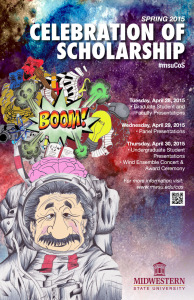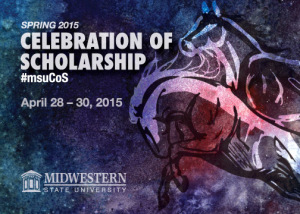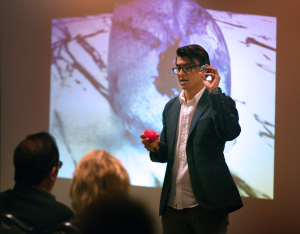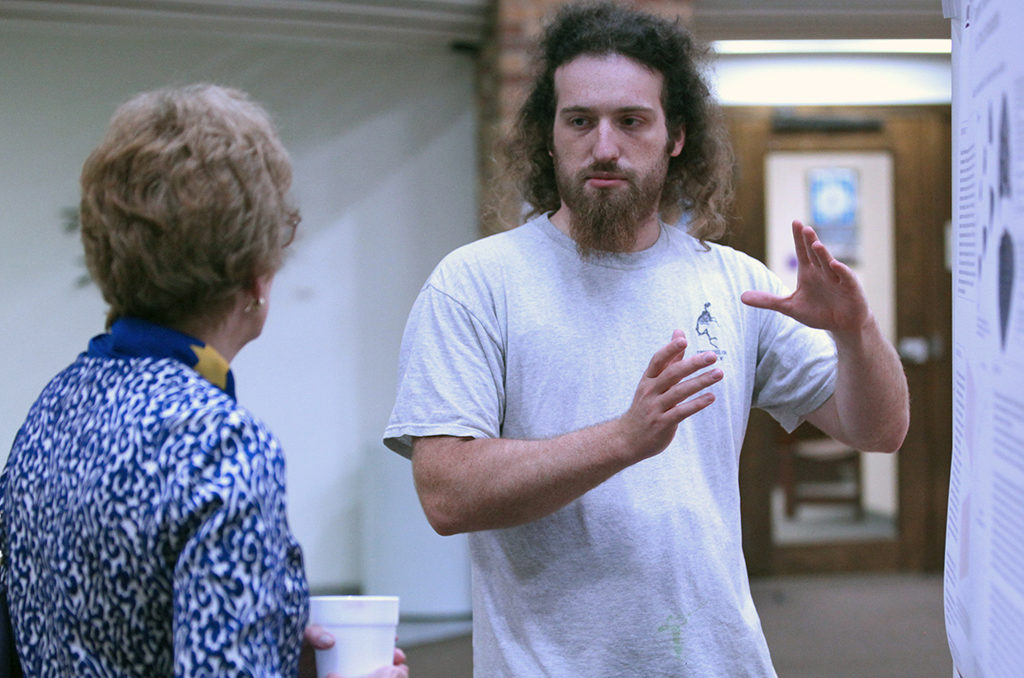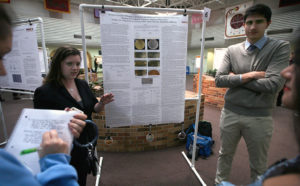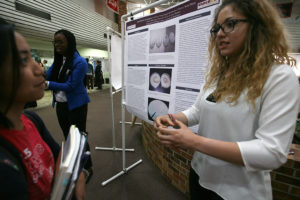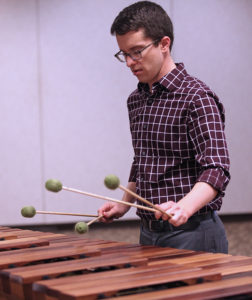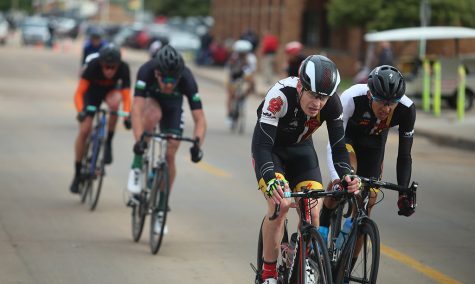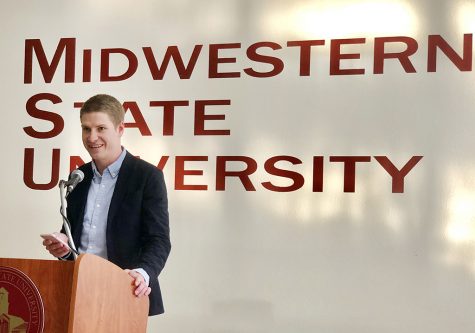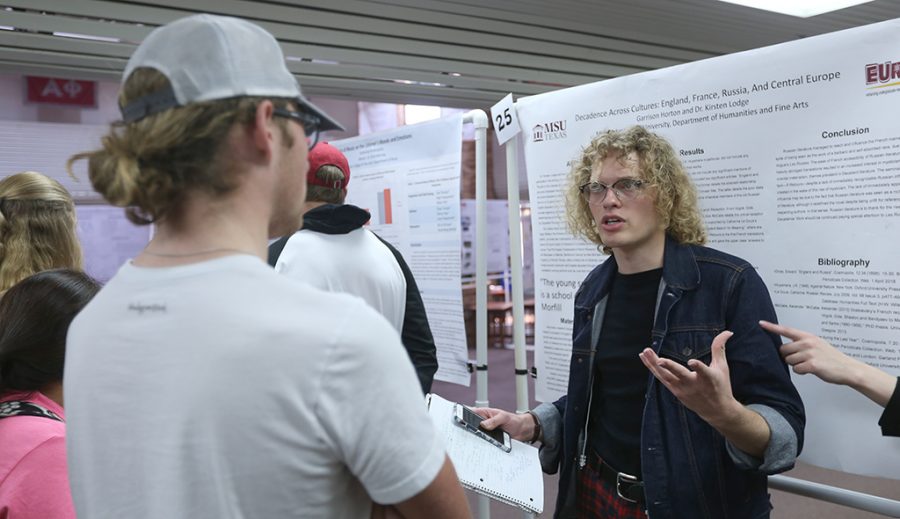![Michael Olaya discusses a three-dimensional printer than can print body parts at the Undergraduate Research and Creative Activities Forum, April 28, 2016. Photo by Bradley Wilson]()
Michael Olaya discusses a three-dimensional printer than can print body parts at the Undergraduate Research and Creative Activities Forum, April 28, 2016. Photo by Bradley Wilson
As part of the growing undergraduate research program, students and faculty spend months researching new ideas or learning new approaches for old ideas. Along the way, they compete for thousands of dollars in prize money and present their projects at different forums worldwide.
The fifth annual Celebration of Scholarship held in 2016 gave undergraduate students, graduate students, and faculty an outlet to showcase their research and was a reflection of the research environment that MSU cultivates in its students.
“Many of the presentations (at the April forum) were not just new pieces of information to the students, but to the disciplines,” Magaly Rincón-Zachary, director of undergraduate research, said. “That’s what research is.”
The university funds the program annually which exceed more than $200,000 per academic year, including research on the 3-D printing of human organs and other body parts by researchers such as Michael Olaya, a junior in mechanical engineering.
“I have been working on my research all semester, printing around 20 to 30 different organs in the process,” Olaya said.
Olaya has been researching his presentation all semester from McCoy Engineering Hall, making plastic prints of human organs for surgeons and other medical professionals to use for pre-surgical planning.
“We plan to keep working on it after the forum, taking the prints to a local OB/GYN for 3-D ultrasounds and reaching out to the local hospitals. It hasn’t cost anything for us to do this. McCoy hall is filled with 3-D printers and we started purely out of curiosity,” Olaya said.
As part of this spring’s forum, in the corner of the Clark Student Center atrium, five mechanical engineering students stood by their poster presentation: MSU Smart Parking System. As students and faculty stopped to learn about poster number 23, the well-dressed engineers eagerly explained their research, overpowering the fact that they had only received two hours of sleep the night before as a result of putting final touches on the project.
Junior Enaho Atamenwan came up with the idea to create a phone application that will help students find parking spots without them having to drive around for long periods of time, helping students get to class on time. It is available for iPhone and Android and works on devices like computers and iPads. The app will go live as soon as more seniors are assembled.
Atamenwan said if everything works out, the system could be up and running by fall.
Psychology and sociology junior Catherine Stepniak, and accounting and sociology senior Careisha Whyte won first place for the undergraduate best poster presentation from not one, but two departments: Prothro Yeager College of Humanities and Social Sciences and Fain College of Fine Arts for their poster Developing a New Newsletter for Association for Applied and Clinical Sociology.
“We were tasked with figuring out the best way to format a newsletter for the AACS to improve and increase its membership and to communicate effectively with its members,” Stepniak said, of the 46-inch by 36-inch poster.
Whyte said, “Our project was an interdisciplinary applied project. We found the members preferred communication medium and made recommendations to the president on how best to implement it.”
Julio Rivera, former president of the national Council on Undergraduate Research, spoke on the importance of the undergraduate research and how it benefits students.
“It’s students learning about subject matter. It’s students leaning about themselves. It’s students learning new skills,” Rivera said. “Undergraduate research is one of those things that is even better for students, so you grow intellectually, and you grow personally in terms of skills and personal development.”
Pre-med freshman Brittni Coss, who attended the event last semester, said she had never seen the Atrium so packed.
“It was really cool to see my peers evaluating posters seriously versus taking it as a joke or only doing it for extra credit. It made me put more thought into my evaluations and ask more questions to the presenters,” Coss said. “The amount of professionalism in the room is something every student should see. It showed me the true value of research and that if I wanted to start my own project, this university grants me easy access to that opportunity.”
To fund the research, students and faculty get funding from various sources.
“We were funded through the school and EURECA, with some outside funding coming into play. On top of that, the Texas State Comptroller has taken its own interests in maybe funding up to $100,000 to try and extend our research,” Tim Torres, chemistry sophomore, said.
Torres and his research partner, Francisco Ramos Armas, entered their independent study with the help of Charles Watson, assistant professor of biology.
The team obtained samples from Riverbend Nature Center, using a variety of different approaches to find more data on the Monarch butterfly, before its possible extinction in 20 years.
“The amount of data we had to go through was the most difficult part of the study. Each sample we analyzed had around 100 to 150 peaks that we had to go through to see if they were coming out correctly. We ended up having around 25 samples altogether, leaving us with more questions than answers,” Armas, biology junior, said.
The group used a span of a month recording data, spending upwards to 80 hours in the lab day after day.
“If we had all day and night to focus on our project then it might not have taken as much time, but with school and everything else, we ended up being busier than anticipated. We spent days and nights in Bolin,” Torres said.
THANKS TO OUR SPONSORS
First Bank of Wichita Falls
Foreign Languages of Midwestern State University
Student Affairs and Enrollment Management
The post Undergrads engage in research appeared first on The Wichitan.
